Catalytic Converter Replacement 4.3L
Removal Procedure
- Raise the vehicle. Refer to Lifting and Jacking the Vehicle in General Information.
- Disconnect the heated oxygen sensor (HO2S) electrical connections from catalytic converter pipe.
- Remove the transmission support. Refer to Transmission Support Replacement in Frame and Underbody.
- Remove the nuts and the seals retaining the catalytic converter pipe to the exhaust manifolds.
- Remove the flange nuts from the catalytic pipe to the muffler.
- Remove the catalytic converter from the vehicle.
- Remove the oxygen sensors as necessary. Refer to Heated Oxygen Sensor Replacement - Bank 1 Sensor 1 in Engine Controls - 4.3L.
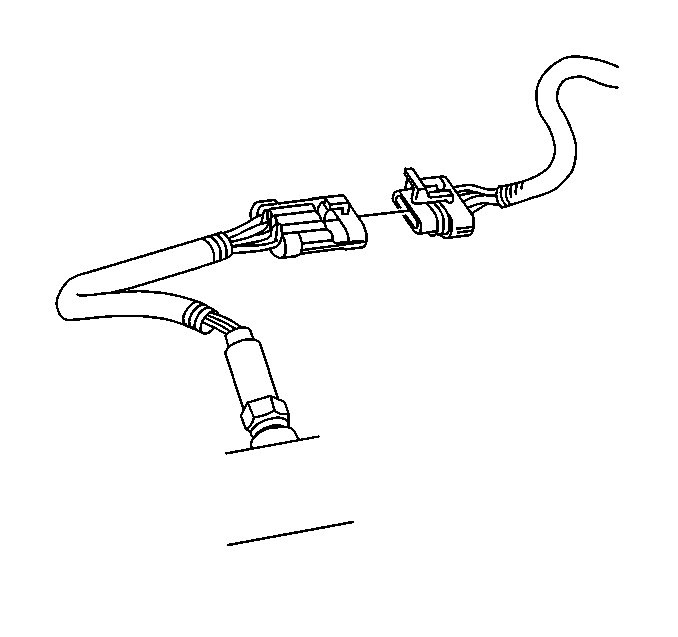
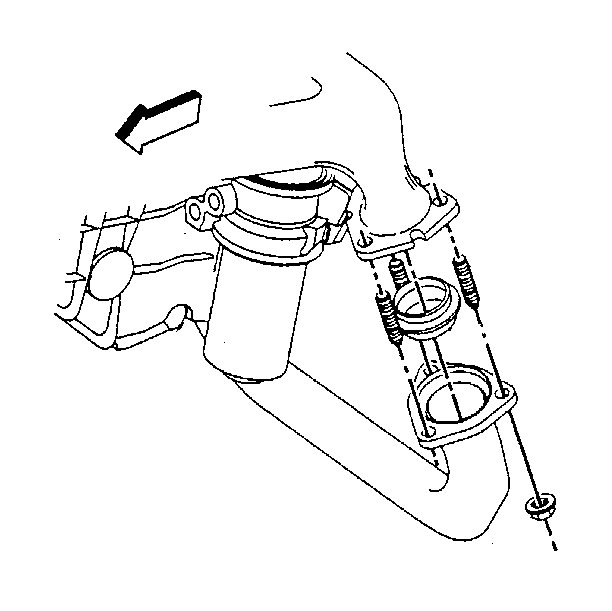
Caution: In order to avoid being burned, do not service the exhaust system while it is still hot. Service the system when it is cool.
Caution: Always wear protective goggles and gloves when removing exhaust parts as falling rust and sharp edges from worn exhaust components could result in serious personal injury.
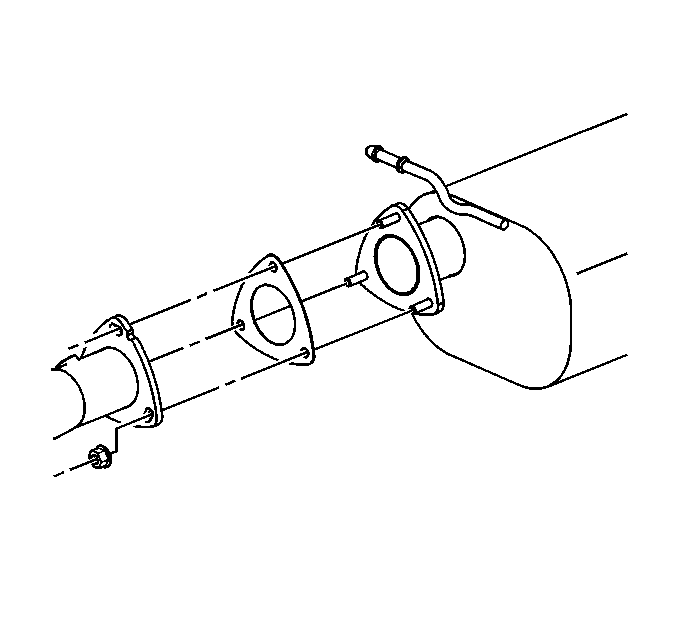
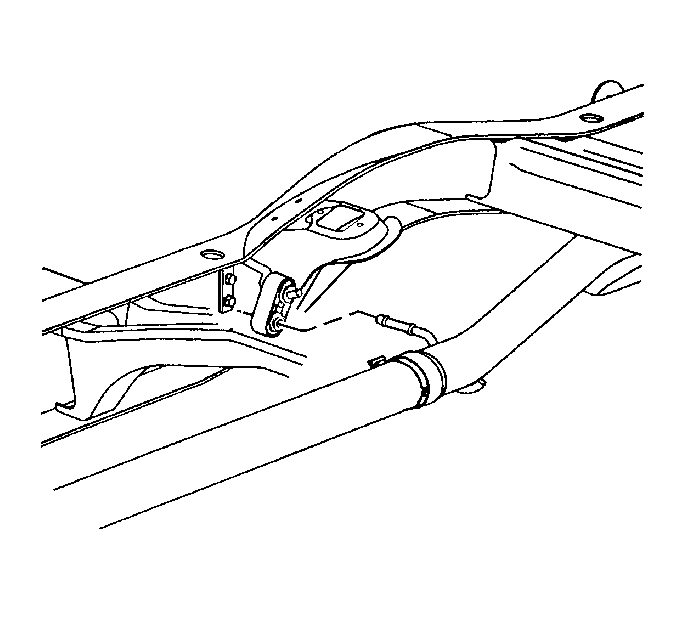
Installation Procedure
- Install the oxygen sensors as necessary. Refer to Heated Oxygen Sensor Replacement - Bank 1 Sensor 1 in Engine Controls - 4.3L.
- Position the catalytic pipe to the vehicle.
- Install the new retaining nuts and gasket to the front of the muffler.
- Install the new seals, the nuts and the exhaust pipe flange to exhaust manifold.
- Connect the HO2S electrical connections.
- Install the transmission support. Refer to Transmission Support Replacement in Frame and Underbody.
- Verify the exhaust system for proper clearance and the alignment of all components.
- Lower the vehicle.

Do not tighten the nuts.

Notice: Use the correct fastener in the correct location. Replacement fasteners must be the correct part number for that application. Fasteners requiring replacement or fasteners requiring the use of thread locking compound or sealant are identified in the service procedure. Do not use paints, lubricants, or corrosion inhibitors on fasteners or fastener joint surfaces unless specified. These coatings affect fastener torque and joint clamping force and may damage the fastener. Use the correct tightening sequence and specifications when installing fasteners in order to avoid damage to parts and systems.
Tighten
| • | Tighten the exhaust pipe flange to exhaust manifold nuts to 65 N·m (48 lb ft). |
| • | Tighten the catalytic converter to muffler retaining nuts to 48 N·m (35 lb ft). |

Notice: When inspecting or replacing exhaust system components, make sure there is adequate clearance from all points on the underbody to prevent overheating of the floor pan and possible damage to the passenger compartment insulation and trim materials.
Catalytic Converter Replacement 5.0L and 5.7L
Removal Procedure
- Raise the vehicle. Refer to Lifting and Jacking the Vehicle in General Information.
- Remove the transmission support. Refer to Transmission Support Replacement in Frame and Underbody.
- Disconnect the oxygen sensors (O2S) and heated oxygen sensor (HO2S) electrical connections from the wiring harness.
- Remove the nuts and the seals retaining the catalytic converter pipes to the exhaust manifolds.
- If equipped with single catalytic converter pipe, remove the nuts retaining the catalytic pipe to the muffler. Depending on the vehicle configuration the flange may be a 2 bolt or 3 bolt flange.
- Remove the catalytic converter pipe flange gasket.
- Remove the catalytic converter pipe from the vehicle.
- If equipped with 2 catalytic converter pipes, loosen the clamp securing the right catalytic converter at the front of the muffler.
- Remove the right catalytic converter pipe from the muffler and the vehicle.
- Remove the left catalytic converter pipe retaining nuts and gasket from the muffler flange connection.
- Remove the left catalytic converter pipe from the vehicle.
- If replacing the catalytic converter, remove the oxygen sensors as necessary. Refer to Heated Oxygen Sensor Replacement - Bank 1 Sensor 1 in Engine Controls - 5.7L.


Caution: In order to avoid being burned, do not service the exhaust system while it is still hot. Service the system when it is cool.
Caution: Always wear protective goggles and gloves when removing exhaust parts as falling rust and sharp edges from worn exhaust components could result in serious personal injury.
Important: If equipped with dual catalytic converter pipes, and removing only the right catalytic converter, the left catalytic converter does not require removal. If removing the left catalytic converter both catalytic converters require removal.

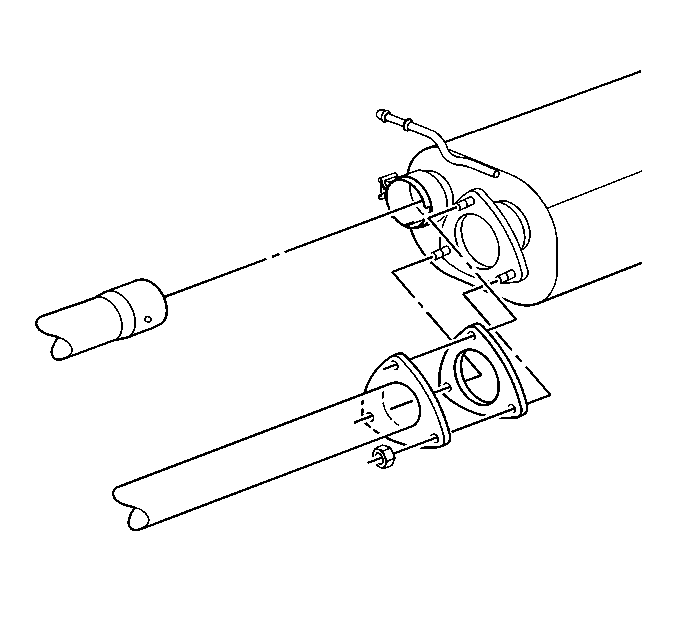
Installation Procedure
- If removed, install the oxygen sensors as necessary. Refer to Heated Oxygen Sensor Replacement - Bank 1 Sensor 1 in Engine Controls - 5.7L.
- If equipped with 2 catalytic converter pipes, install the left catalytic converter and gasket to the muffler flange.
- Install the nuts for left catalytic converter to muffler.
- Install the right catalytic converter into the muffler.
- Install the right catalytic converter clamp.
- If equipped with a single catalytic converter pipe, install the pipe with a new gasket to the muffler flange.
- Install a new seal and the catalytic converter pipe to the exhaust manifolds.
- Install the nuts retaining the catalytic converter pipes to the exhaust manifolds.
- Connect the oxygen sensor (O2S) electrical connection.
- Install the transmission support. Refer to Transmission Support Replacement in Frame and Underbody.
- Verify the exhaust system for proper clearance and the alignment of all components.
- Lower the vehicle.

Do not tighten the flange nuts.
Do not tighten the clamp.

Do not tighten the flange nuts.

Notice: Use the correct fastener in the correct location. Replacement fasteners must be the correct part number for that application. Fasteners requiring replacement or fasteners requiring the use of thread locking compound or sealant are identified in the service procedure. Do not use paints, lubricants, or corrosion inhibitors on fasteners or fastener joint surfaces unless specified. These coatings affect fastener torque and joint clamping force and may damage the fastener. Use the correct tightening sequence and specifications when installing fasteners in order to avoid damage to parts and systems.
Tighten
| • | Tighten the catalytic converter pipe to exhaust manifold nuts to 65 N·m (48 lb ft). |
| • | Verify that the exhaust system is properly aligned and tighten the right catalytic converter clamp to 54 N·m (40 lb ft). |
| • | Tighten the catalytic converter to the muffler nuts to 48 N·m (35 lb ft). |
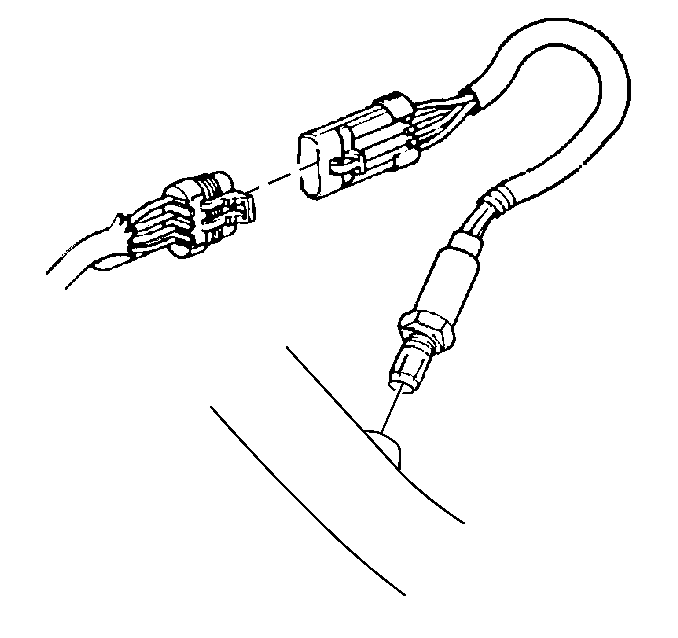
Notice: When inspecting or replacing exhaust system components, make sure there is adequate clearance from all points on the underbody to prevent overheating of the floor pan and possible damage to the passenger compartment insulation and trim materials.
Catalytic Converter Replacement 8.1L
Removal Procedure
Caution: In order to avoid being burned, do not service the exhaust system while it is still hot. Service the system when it is cool.
Caution: Always wear protective goggles and gloves when removing exhaust parts as falling rust and sharp edges from worn exhaust components could result in serious personal injury.
Important: If removing only the left side catalytic converter, the right side catalytic converter does not require removal. If removing the right side catalytic converter both left and right catalytic converters need to be removed.
Left Side
- Raise and suitably support the vehicle with jack stands. Refer to Lifting and Jacking the Vehicle in General Information.
- Disconnect the heated oxygen sensor (HO2S) electrical connectors.
- Loosen the catalytic converter clamp at the muffler.
- Remove the catalytic converter nuts and exhaust seal.
- Remove the left catalytic converter pipe.
- If replacing the left catalytic converter, remove the HO2S as necessary. Refer to Heated Oxygen Sensor Replacement - Bank 1 Sensor 1 or Heated Oxygen Sensor Replacement - Bank 1 Sensor 2 in Engine Controls - 8.1L.



Right Side
- Disconnect the HO2S electrical connectors.
- Remove the catalytic converter pipe nuts and gasket from the muffler.
- Remove the catalytic converter nuts and exhaust seal.
- Remove the right catalytic converter pipe.
- If replacing the right catalytic converter, remove the HO2S as necessary. Refer to Heated Oxygen Sensor Replacement - Bank 2 Sensor 1 or Heated Oxygen Sensor Replacement - Bank 2 Sensor 2 in Engine Controls - 8.1L.


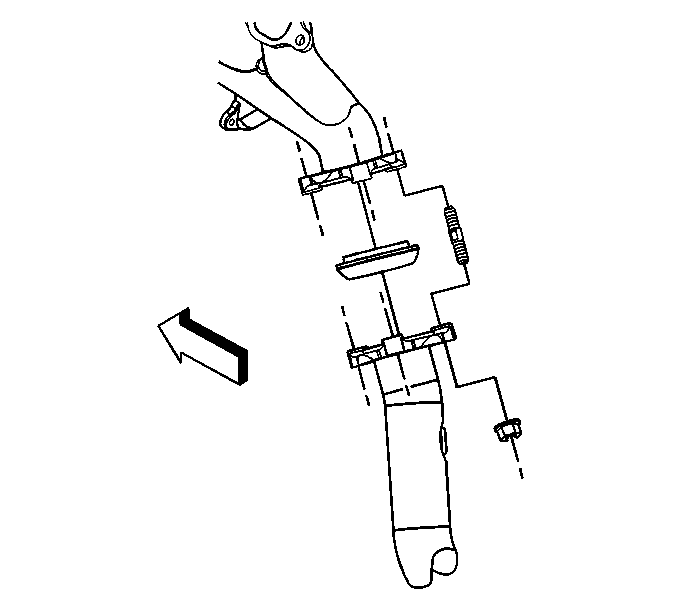
Installation Procedure
Right Side
- If replacing the right catalytic converter, install the HO2S as necessary. Refer to Heated Oxygen Sensor Replacement - Bank 2 Sensor 1 or Heated Oxygen Sensor Replacement - Bank 2 Sensor 2 in Engine Controls - 8.1L.
- Install the right catalytic converter pipe.
- Install the right exhaust seal and catalytic converter nuts.
- Install the right catalytic converter pipe gasket and nuts to the muffler.
- Connect the HO2S electrical connector.

Notice: Use the correct fastener in the correct location. Replacement fasteners must be the correct part number for that application. Fasteners requiring replacement or fasteners requiring the use of thread locking compound or sealant are identified in the service procedure. Do not use paints, lubricants, or corrosion inhibitors on fasteners or fastener joint surfaces unless specified. These coatings affect fastener torque and joint clamping force and may damage the fastener. Use the correct tightening sequence and specifications when installing fasteners in order to avoid damage to parts and systems.
Tighten
Tighten the catalytic converter pipe to exhaust manifold nuts to 65 N·m
(48 lb ft).

Tighten
Tighten the catalytic converter to the muffler nuts to 48 N·m
(35 lb ft).

Left Side
- If replacing the left catalytic converter, install the HO2S as necessary. Refer to Heated Oxygen Sensor Replacement - Bank 1 Sensor 1 or Heated Oxygen Sensor Replacement - Bank 1 Sensor 2 in Engine Controls - 8.1L.
- Install the left catalytic converter pipe.
- Install the left exhaust seal and catalytic converter nuts.
- Tighten the catalytic converter clamp at the muffler.
- Connect the HO2S electrical connectors.
- Lower the vehicle.

Notice: Use the correct fastener in the correct location. Replacement fasteners must be the correct part number for that application. Fasteners requiring replacement or fasteners requiring the use of thread locking compound or sealant are identified in the service procedure. Do not use paints, lubricants, or corrosion inhibitors on fasteners or fastener joint surfaces unless specified. These coatings affect fastener torque and joint clamping force and may damage the fastener. Use the correct tightening sequence and specifications when installing fasteners in order to avoid damage to parts and systems.
Tighten
Tighten the catalytic converter pipe to exhaust manifold nuts to 65 N·m
(48 lb ft).

Tighten
Tighten the catalytic converter clamp to 54 N·m (40 lb ft).

Catalytic Converter Replacement 6.5L
Removal Procedure
- Raise the vehicle. Refer to Lifting and Jacking the Vehicle in General Information.
- Remove the nuts retaining the catalytic converter pipe to the turbocharger.
- Remove the flange nuts from the rear of the catalytic convertor assembly.
- Remove the catalytic converter from the vehicle.
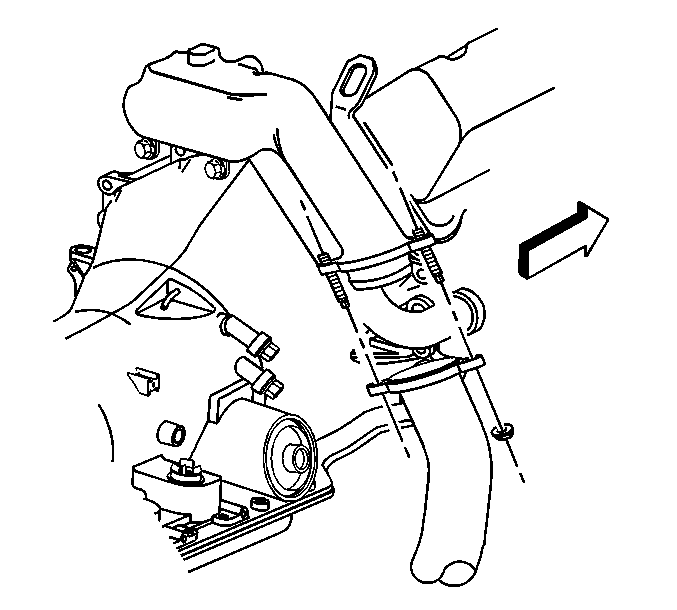
Caution: In order to avoid being burned, do not service the exhaust system while it is still hot. Service the system when it is cool.
Caution: Always wear protective goggles and gloves when removing exhaust parts as falling rust and sharp edges from worn exhaust components could result in serious personal injury.
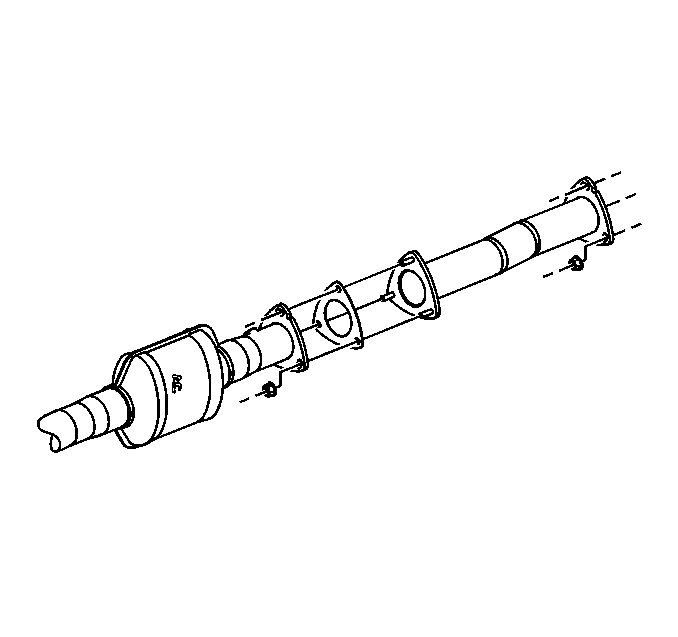
Installation Procedure
- Install the new retaining nuts and gasket to the rear of the catalytic convertor assembly.
- Install the catalytic converter pipe and nuts the turbocharger
- Verify the exhaust system for proper clearance and the alignment of all components.
- Lower the vehicle.

Do not tighten the nuts.

Notice: Use the correct fastener in the correct location. Replacement fasteners must be the correct part number for that application. Fasteners requiring replacement or fasteners requiring the use of thread locking compound or sealant are identified in the service procedure. Do not use paints, lubricants, or corrosion inhibitors on fasteners or fastener joint surfaces unless specified. These coatings affect fastener torque and joint clamping force and may damage the fastener. Use the correct tightening sequence and specifications when installing fasteners in order to avoid damage to parts and systems.
Tighten
| • | Tighten the catalytic converter pipe to turbocharger nuts to 20 N·m (16 lb ft). |
| • | Verify that the exhaust system is properly aligned and tighten the catalytic converter rear flange nuts to 48 N·m (35 lb ft). |
Notice: When inspecting or replacing exhaust system components, make sure there is adequate clearance from all points on the underbody to prevent overheating of the floor pan and possible damage to the passenger compartment insulation and trim materials.
